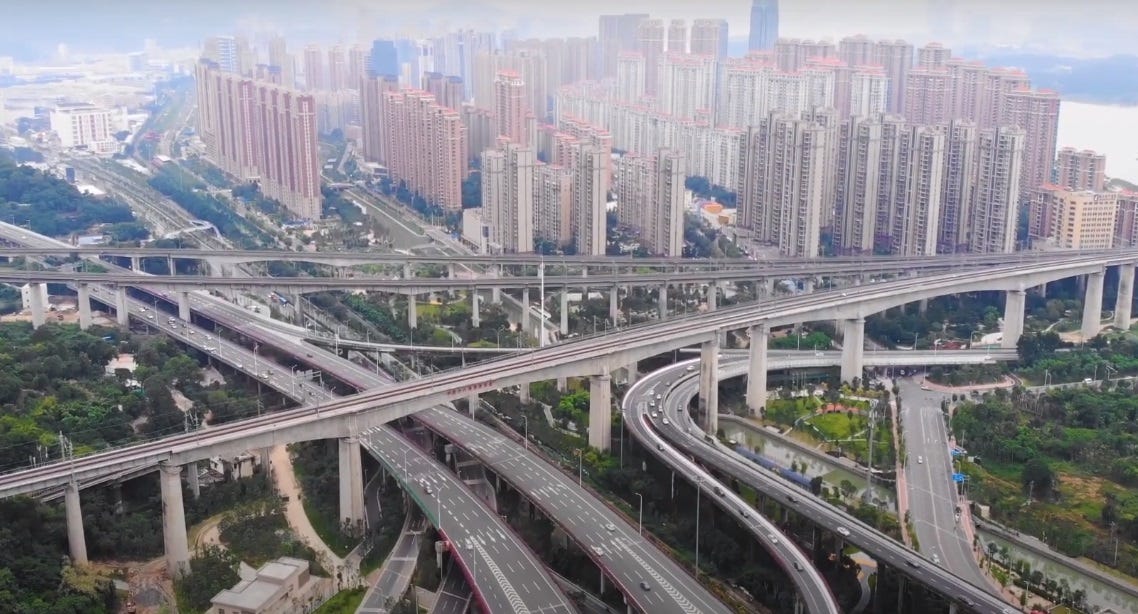The China 2023 series
All the posts in one handy list
“The dawn mist spun away. Cues of men with lunch-boxes clumped away toward the immensity of new factories, sheets of glass and hollow tile, glittering shops where five thousand men worked beneath one roof, pouring out the honest wares that would be sold up the Euphrates and across the veldt. The whistles rolled out in greeting a chorus cheerful as the April dawn; the song of labor in a city built — it seemed — for giants.” — Sinclair Lewis, “Babbitt”
I’ve been writing a lot more about China’s economy since 2021. A lot of interesting things happened in that year and the year that followed — the IT crackdown, the real estate bust, Zero Covid, export controls, friend-shoring, and new industrial policy on both sides of the Pacific. It was a turbulent and exciting time. But in 2023, the fallout from those events — as well as the from longer-term trends — started to give us the outlines of a new equilibrium. China’s time as a fast-growing developing country is over; its reign as a technologically sophisticated incumbent economic power has begun.
My interview with Dan Wang back in May made me want to write down my thoughts about this evolution. After 2021-22, some people have come to see me as a China “bear” or pessimist; in fact, this isn’t the case. There were simply a lot of things going wrong in those years; now that things are reaching a new normal, some very positive threads are apparent as well. I tried to make this series a balanced one — to showcase the things China is great at, as well as explaining why its economy is no longer the growth powerhouse it once was. I tried to hit all the important areas: natural economic strengths and weaknesses, industrial policy, the real estate sector, international relations and investment, long-term growth prospects, and the current macroeconomic situation.
Interview: Dan Wang, China specialist
I still recall a day seven years ago when Dan Wang invited me to lunch and asked my advice. He was considering moving to China to work for the research firm Gavekal Dragonomics, and wanted to know if I thought this would be a good career move. I answered with an unequivocal “Yes”, and I’m happy to say that I was right, because Dan quickly became one of …
In this post I talk to writer and researcher Dan Wang, who has provided some of the most incisive commentary about China’s technological strengths and weaknesses over the last few years. I think Dan does an excellent job of explaining why China has managed to dominate so many manufacturing industries so quickly, and why those same strengths will serve it well in many areas in the years to come. But Dan doesn’t believe Chinese technological dominance is assured; in particular, bad government policy could scuttle it.
Which industries will China dominate?
Nothing like the current era of international industrial competition has ever been seen before. Nothing like modern distributed supply chains even existed until the last few decades. The competition between the U.S., Japan, and Europe over cars and semiconductors in the 80s and 90s is probably the closest parallel…
This post was actually written before I published my interview with Dan, though the interview was largely completed by then. The basic conceit is that China is still very focused on the industrial strategy of copying foreign technology, applying advantages of scale, and then underselling foreign competitors on price. In some industries that approach gets a lot of market share; in others, it’s not as effective. For example, China has had an easier time breaking into the EV market than the traditional internal combustion car market. The framework I sketch out in this post is sort of a prelude to my later post, “Where China is beating the world”.
Decoupling is just going to happen
I think we’re about due for another update on the China decoupling situation. Decoupling isn’t just a geopolitical or military thing; it’s going to be one of the most important economic trends of the next couple of decades. In other words, whether you’re trying to make money or make policy, it’s something you probably need…
A big part of China’s economic story has been foreign investment. Foreign companies have been incredibly eager to access the Chinese market, even after China stopped being such a cheap production base. This drew massive amounts of FDI into China for many years. But recently these numbers have been faltering; decoupling hasn’t really happened with trade yet, but it is happening in the world of investment. The process is almost certainly going to continue, due to the combination of war risk and Chinese efforts to indigenize their supply chains.
Where China is beating the world
Interviewing Dan Wang has made me want to write more about China’s economy, so here’s one of a short series of posts. Over the past two years I’ve written a lot of criticism of China’s economic policies. There were basically two reasons for that: First, China really did make a bunch of policy blunders during that time, a…
Like a lot of writers, I spent 2021 and 2022 focusing on the things that were going wrong for China. But at the same time, the country was still achieving marvels — a world-beating electric vehicle industry, a massive high speed rail network, and the largest green energy buildout on Earth. Yes it has plenty of challenges, but if you think China is yesterday’s news, think again.
Real estate is China's economic Achilles heel
This is the second in a short series of posts about China’s economy. The first post, from last week, was entitled “Where China is beating the world”. I once joked to a friend that if I were a CIA operative and I wanted to slow down China’s economy, I’d try to get everyone in the country to be obsessed with real estat…
It’s really impossible to understand China’s economy right now without understanding the role of the real estate sector. Real estate is a lot of things to China — its main source of employment, its main financial asset, its main method of macroeconomic stimulus, and its main source of government revenue. How China’s economy will function in an era where real estate is no longer constantly growing is probably the most important economic question the country is facing right now.
Four reasons China can't reset the world
I see China’s basic strategy right now as trying to reset the world of 2015. Eight years ago, China’s economy was still growing rapidly, investment and technology transfer from Western companies were still pouring in with very little resistance from Western governments, and China was viewed warily but not negatively on the international stage. After two years of economic stumbles and a hardening geopolitical environment, it’s understandable that Xi Jinping would want to reset the board to when he was clearly winning.
Much of China’s economic story in the decades to come will be written outside China. The question of how much and in what ways China and the developed democracies will decouple will be extremely important. And crucially, much of that decoupling — perhaps even most — is actually being driven by the Chinese side. In this post, I try to explain why Chinese policy priorities make some degree of economic separation inevitable.
China at the peak
This is the last post in my short series about China’s economy in 2023. As usual, I’ll have a post where I link to the whole series. In the 2010s, everyone knew that China was “the future”. In the 2020s, it feels more like the present. China has fully arrived on the world stage. Around the world, people’s houses are full of Chinese products, they spend t…
China’s growth has slowed, and this has a lot of people asking whether the country will now decline, at least in relative terms. Many talk about aging as the chief driver of decline. In this post I explain why although I think aging will be a persistent drag on China’s economy, I don’t expect it to be as bad as many others. But I also note that growth prospects for the rest of Asia — which some are now calling “Altasia” — look more promising. If China is the present, Altasia is the future.
What should China do to revive its economy?
OK, I know I said that the previous post in my China’s Economy in 2023 series would be the last one, but I just can’t resist writing one more. In the earlier posts I talked mainly about structural long-term issues, but I really should write something about the macroeconomic situation.
Thinking about the long term is great, but the short term matters too. China is now in a slump driven by the real estate bust. To get out of that slump, I suggest two things: 1) Cut checks to regular Chinese people, and 2) Build out a world-class health care system. Other alternatives look much less promising.
Plans for the next series
I’ll still write about China from time to time — it’s too important not to — although I expect the basic story to change less now that the big events of 2021-22 are over. I think I’m going to follow my own advice and write a lot more about Altasia, and how it might come together as a network of supply chains, cross-border investment, and technology transfer and innovation. I think this is going to be the next big geo-economic story, and there is a lot to cover.











This is an awesome amount of good work... congratulations.
Could you write about the social situation in South Korea, especially the “Hell Joseon” phenomenon? Much of its cultural exports (aside from music) such as Squid Game and Parasite deal with lack of social mobility, poverty and inequality.